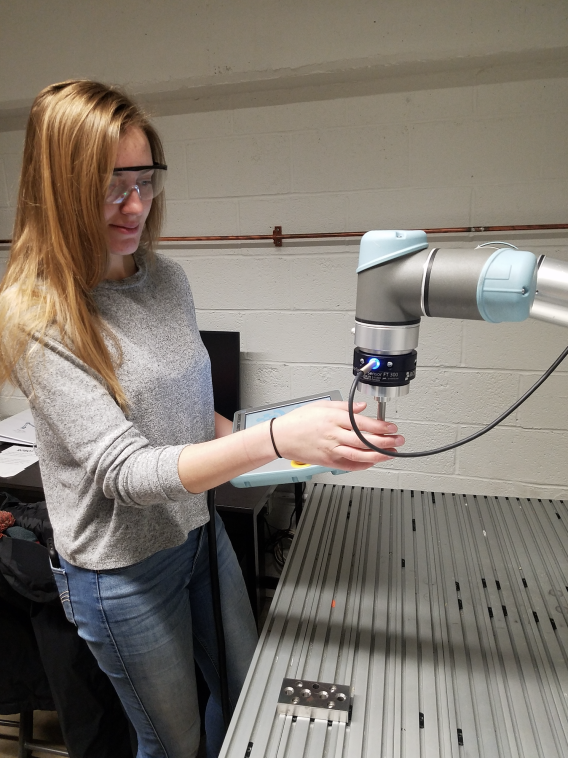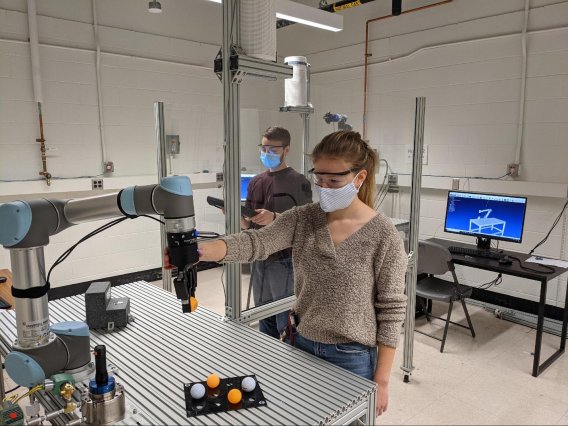ME Senior Labs
Mechanical Engineering Senior Lab Course information
All ME Students are required to complete one senior laboratory course as part of their undergraduate program.
Students may choose between several courses, as outlined below.
- Requirement is listed as “Major Course Elective” on APAS report
- A second senior lab can be used as a technical elective
- Schedules are subject to change based on enrollment and instructor availability
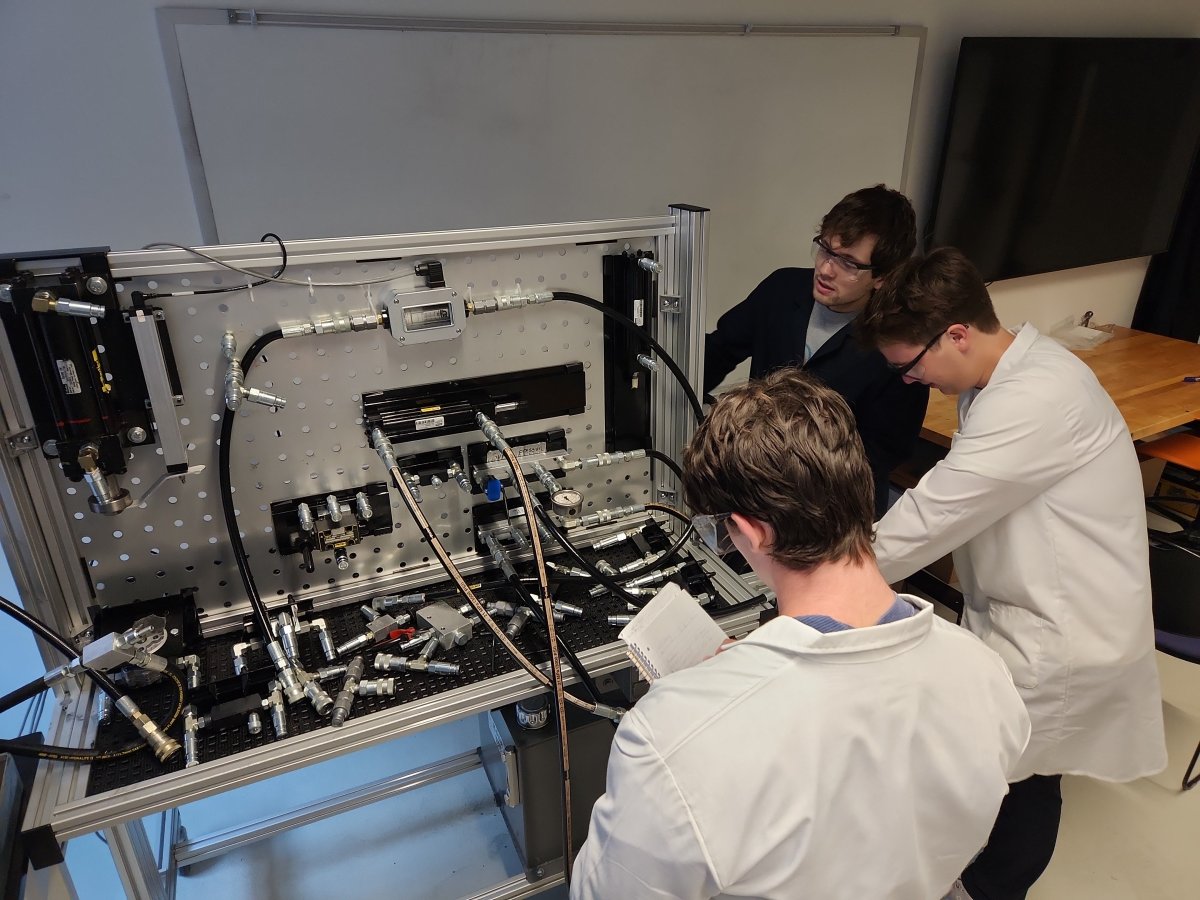
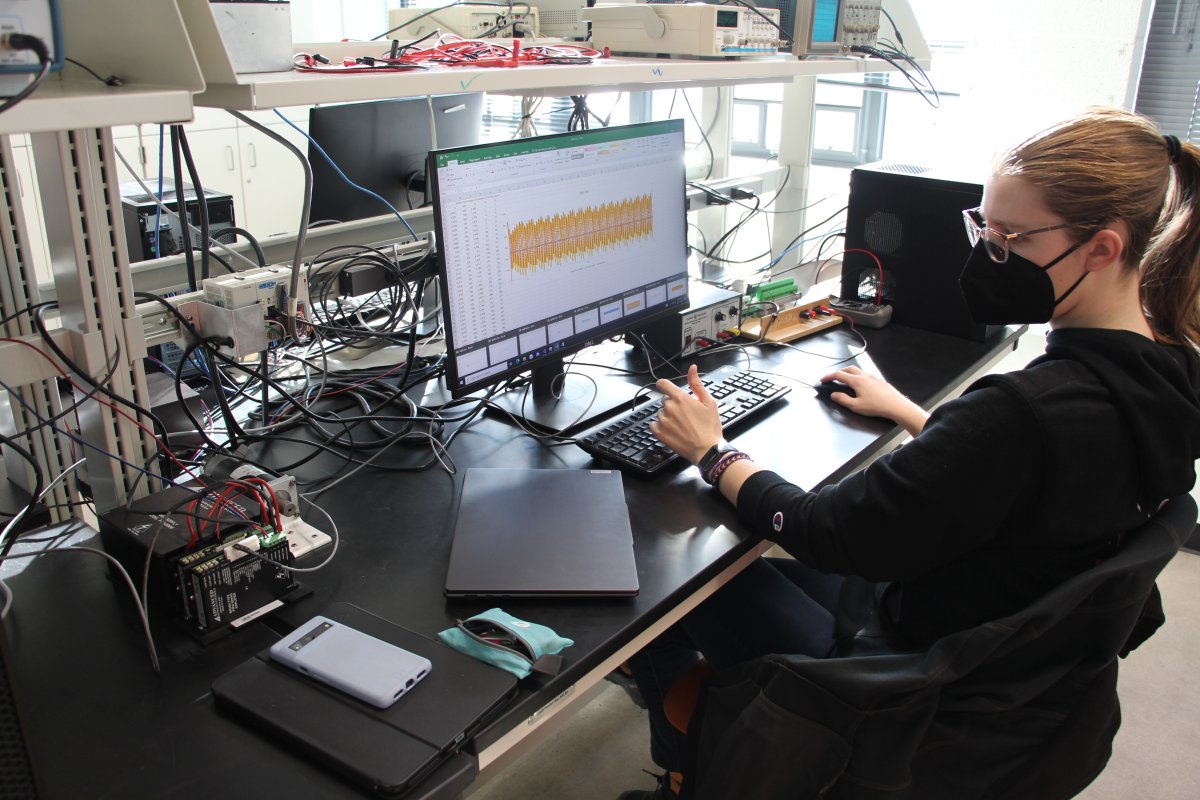
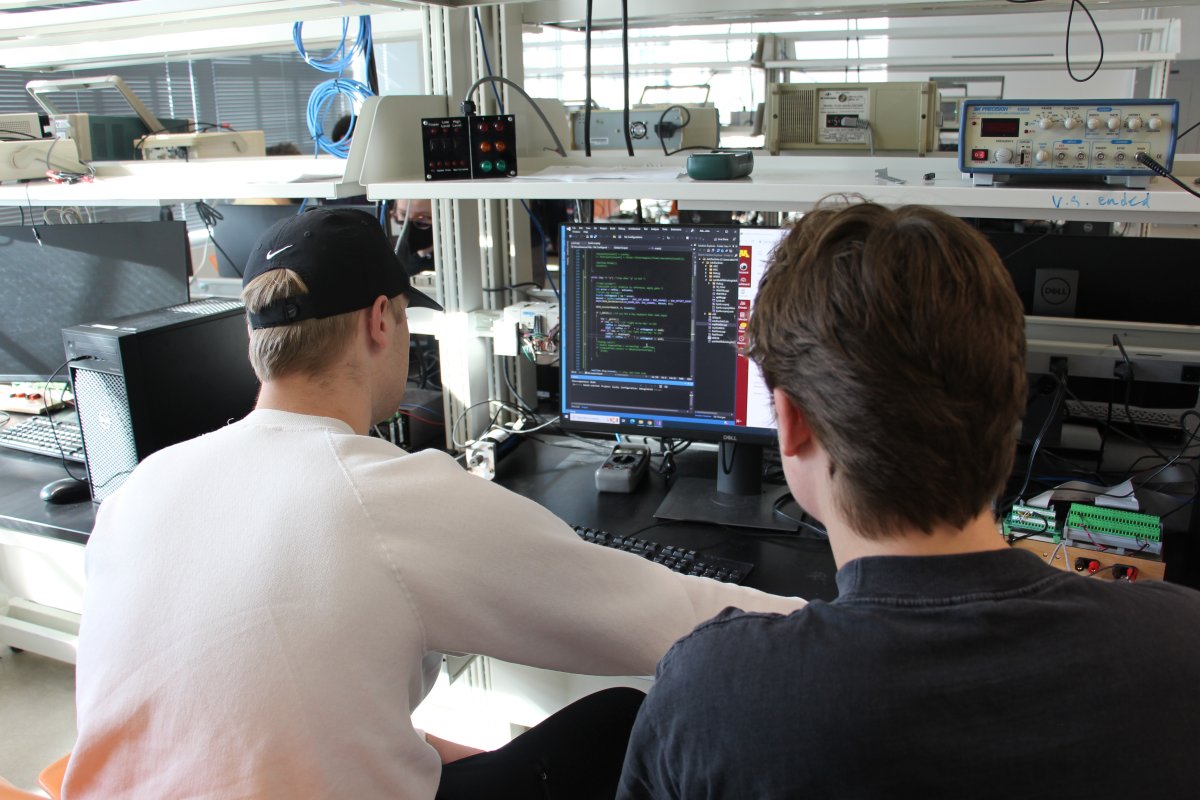
+
ME 4080 - Special Topics: Biosystems and Biodevices Lab
In this lab, you will learn about biological systems such as blood flow through the body or the electrical systems that control muscles. You will explore how to record the responses of these systems with sensors and analyze the measured data. Armed with this knowledge, you will be better prepared to engineer solutions for the medical industry or to draw inspiration from the biological systems that surround us as you develop solutions for any industry.
Will receive a designated course number in summer/fall of 2024.
Topics:
- Bio-systems: Electromyography, blood flow
- Bio-measurements: Electromyography, kinesiology, ergonomics
- Design for bio: Shape memory alloys, biofluids, cryopreservation
- Bio-inspired: Materials, solar energy
Lab Work:
- Examine the freeing mechanics of cryopreservatives
- Examine biomechanical forces measured at our feet are affected for different tasks
- Build an electromyography (EMG) system to measure signals within the body
- Measure the characteristics of shape memory materials
- Simulate blood flow through the circulatory system
- Build solar cells powered by bio-inspired materials
Industries: Biomedical devices, pharma & biotech, product design, health care
Prerequisites: BIOL 1009 or equivalent, ME 3332, ME 3333, ME 4031
Offering Schedule: Spring
Structure: 50 minute lecture 2x/week, 3 hour lab 1x/week
+
ME 4131W - Indoor Environment & Energy Lab: Examine building climate systems and their impacts on the global climate
This class explores one of the largest sources of energy consumption that surrounds us every day: the heating and cooling systems managing our indoor environments. Real-world applications are examined around the Twin Cities and on campus. These systems and their impacts are considered within a global context through discussions relating course topics to current events.
This course (and ME 4431W) is recommended to students who may need to complete an additional writing intensive course.
Topics:
- Building energy conservation and electrification
- Examine local case examples (Twin Cities & UMN campus)
- Real-world emissions and climate change
- Course material as it relates to current events
Lab Work:
This lab is writing intensive, and includes two formal lab reports.
- Airflow measurement & psychometrics
- Solar energy
- Refrigeration
- Air quality
Industries: HVAC, sustainability, public health, building/construction
Prerequisites: ME 3333, ME 4031
Offering Schedule: Fall
Structure: 2 hour lecture 1x/week, 3 hour lab 1x/week
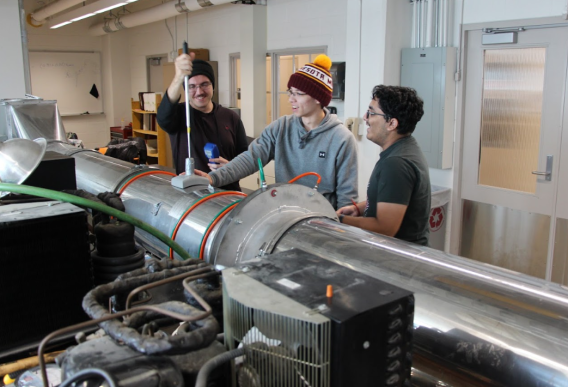
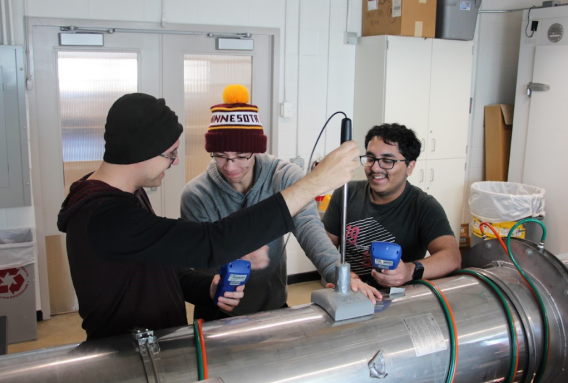
+
ME 4231 - Motion Control Lab: Explore controls concepts by designing digital motion controllers in this lab
This course provides a wide and deep survey of motion control system fundamentals. Case studies and examples from industry are provided in the lecture to complement the experiments performed in the lab. In the lab, you will apply these concepts to create digital control systems in C, MATLAB, and Simulink as well as with programmable logic controllers (PLCs). Lab work includes creating control systems for DC motors and a washing machine “mockup.”
Topics:
- Controls principles and applications
- Case studies
- Real time programming (C, Matlab, Simulink)
- System dynamics & modeling
- Electromechanical systems
- Signal filtering
- Industrial process control (PLCs)
Lab Work:
- Review of C programming
- Digital filtering
- System ID
- Closed-loop motor control
- PID control
- Simulink
- Introduction to PLCs and ladder logic
Industries: Automation engineering, robotics, sensors, defense, medicine
Prerequisites: ME 3281, ME 4031
Offering Schedule: Fall/Spring
Structure: 2 hour lecture 1x/week, 3 hour lab 1x/week
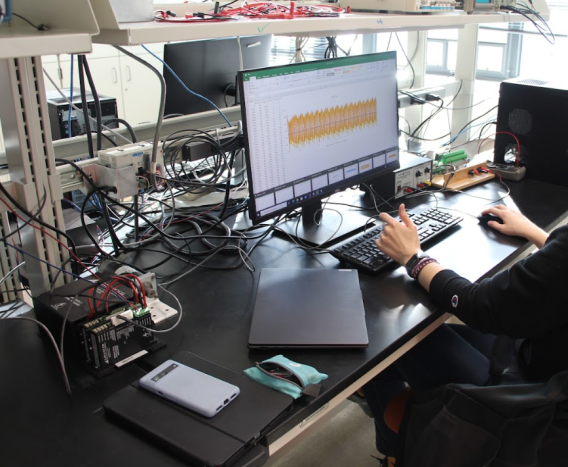
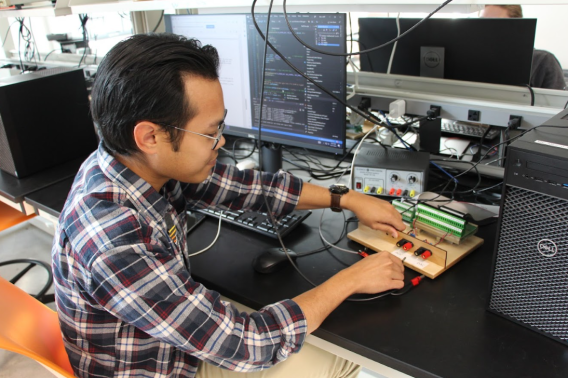
+
ME 4232 - Fluid Power Control Lab: Build your own hydraulic and control systems
This lab provides hands-on experience with hydraulic systems by allowing you to build up the circuits that you test in the lab. Various valves, actuators, and motors are provided, including test setups to examine the output of hydrostatic transmissions, power steering systems, and industrial actuators. In this lab, you will get to apply control system concepts to accurately control the position or load applied by hydraulic actuators.
Topics:
- Fluid power applications
- Introduction to fluid power components (pumps, valves, actuators)
- Hydraulic circuit analysis
- Dynamic modeling of hydraulic systems
- Control of hydraulic systems for specific objectives
Lab Work:
- Configure hydraulic circuits by connecting the components provided in the lab
- Measure the input and output of your hydraulic systems
- Configure control systems for linear and rotary hydraulic actuators
Industries: Clean energy, hydraulics, automotive, agriculture, defense
Prerequisites: ME 3281, ME 4031
Offering Schedule: Fall/Spring
Structure: 2 hour lecture 1x/week, 2 hour lab 2x/week
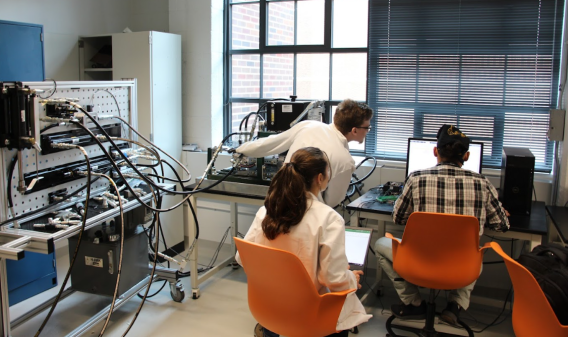
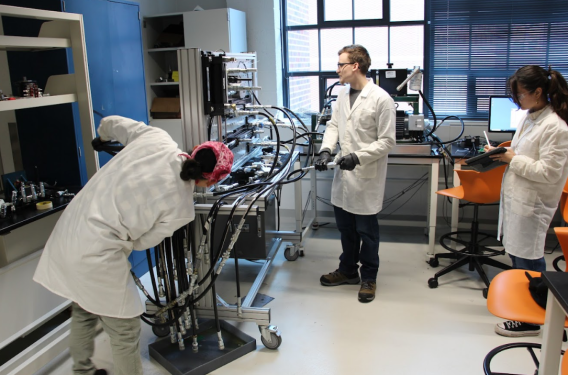
+
ME 4331 - Thermal Energy Engineering Lab: Understand basic heat transfer phenomena and experimental techniques
The course seeks to provide hands-on experience with heat transfer experiments, similar to those that might need to be designed for measuring heat transfer coefficients, or thermal properties in industrial settings. Lectures discuss forthcoming experiments and provide background information necessary for understanding the design principles of the experiment. Some lectures will also discuss experimental techniques that are not covered in laboratory experiments.
Topics:
- Thermal sciences and measurement fundamentals
- Boiling fundamentals
- Parallel and counterflow heat exchangers
- Finned array heat exchangers
- Heat and mass transfer
- Transient conduction & numerical solution methods
- Radiation properties
Lab Work:
- Characterize heat exchanger performance
- Transient conduction and numerical methods
- Heat transfer from a fin array
- Pool boiling
- Infrared imaging: calibration and measurement
Industries: Thermal engineering, transportation, manufacturing, agriculture
Prerequisites: ME 3331, ME3332, ME 3333 ME 4031W
Offering Schedule: Fall
Structure: 2 hour lecture 1x/week, 3 hour lab 1x/week
+
ME 4431W - Energy Conversion Systems Lab: Investigate energy sources and their implications for our energy future
In this lab, you will learn about the operating principles of the component devices encountered in energy conversion systems such as engines, power plants, and heating systems. Experiments will allow you to instrument and measure these components to find their performance characteristics. Concepts are discussed in the context of effects on the global energy economy to investigate the impact of our energy choices.
This course (and ME 4131W) is recommended to students that may need to complete an additional writing intensive course.
Topics:
Note: This lab is writing intensive, and includes technical memos and lab reports.
- Air compressor
- IC engine
- Gas turbine
- Fuel cell
- (Sustainable aviation fuel project with RC jet)
Lab Work:
- Configure hydraulic circuits by connecting the components provided in the lab
- Measure the input and output of your hydraulic systems
- Configure control systems for linear and rotary hydraulic actuators
Industries: Clean/renewable energy, building/construction, public health
Prerequisites: ME3333, ME 4031
Offering Schedule: Fall
Structure: 50 minute lecture 2x/week, 3 hour lab 1x/week
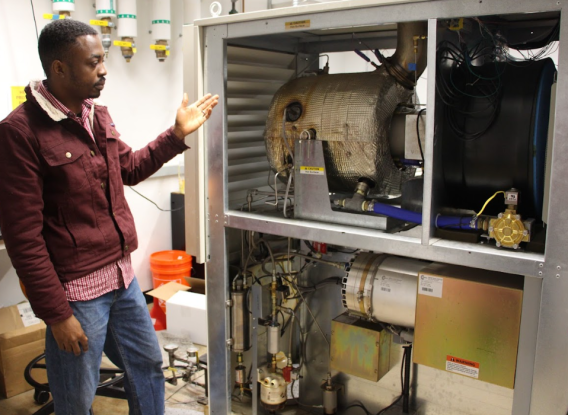
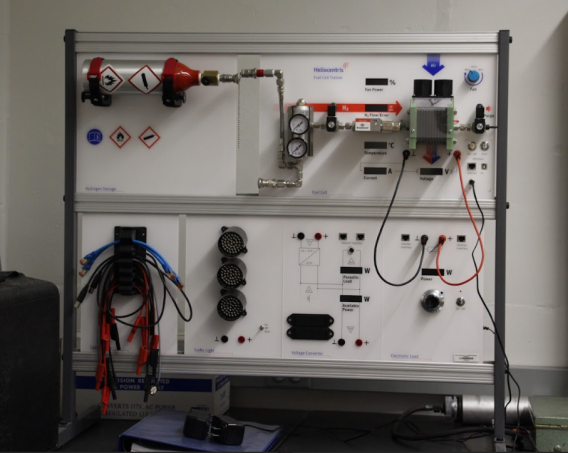
+
ME 5248 - Vibration Engineering: Model and design solutions for common vibration problems
In this lab, you will learn to apply vibration theory to engineering design. Common vibration problems will be examined, including imbalance rotating equipment, resonance, shock loading, vibration transmission, and acoustic emissions. You will learn how to model systems as simplified mass-spring-damper systems. These models will help you to design solutions such as vibration isolators or tuned-mass dampers. Applications for these techniques are discussed including the design of earthquake-resistant structures and considerations for machine design.
Topics:
- Model common vibration problems
- Resonance
- Balancing
- Vibration isolation and absorption
- Acoustic emissions and filtering
- Shock response
Lab Work:
- Measure vibrational response with accelerometers and potentiometers
- Data acquisition and analysis
- Vibration Absorber
- Acoustic Filters
Industries: Machine design, building/construction design, safety, public health
Prerequisites: ME3281
Offering Schedule: Even spring
Structure: 2 hour lecture 2x/week, 90 minute lab 1x/wk
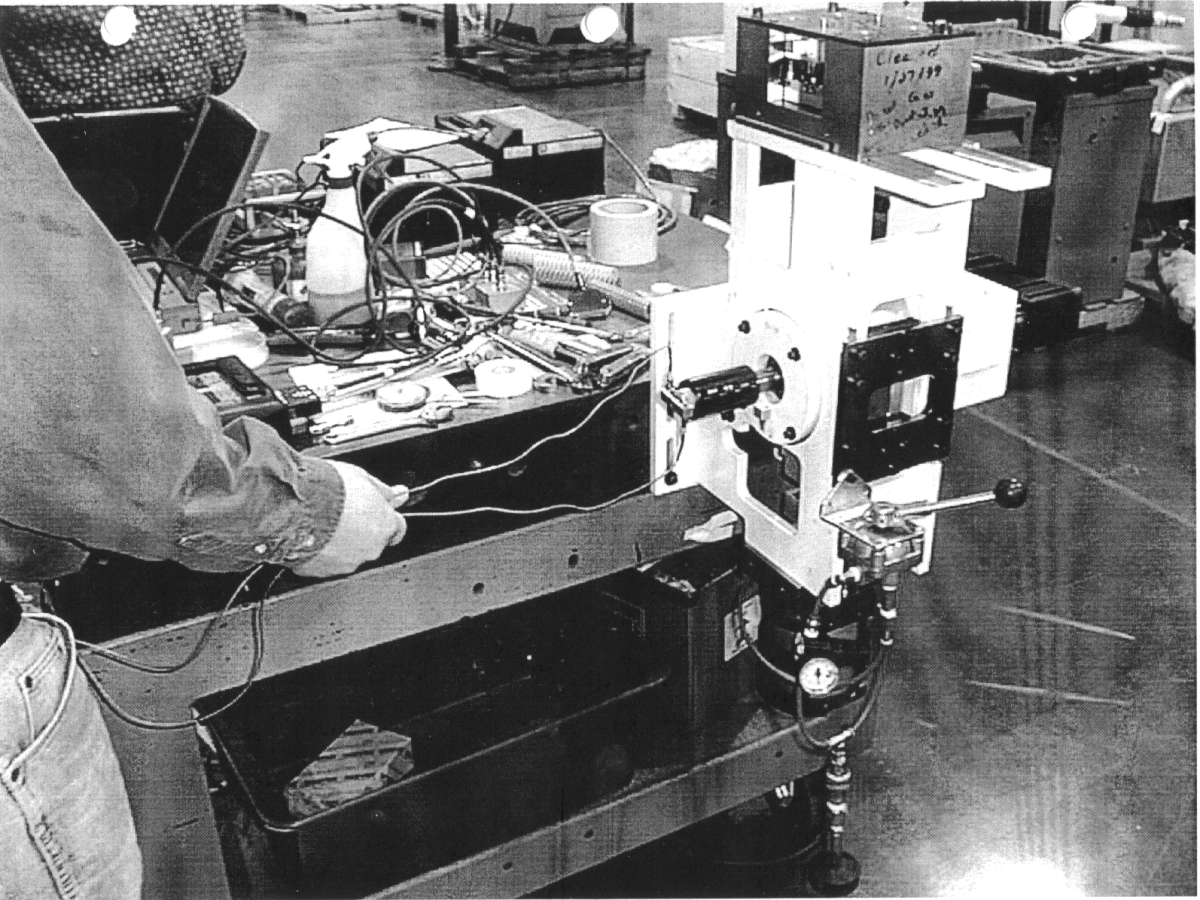
+
ME 5286 - Robotics: Learn to control a robotic arm and utilize machine vision
In this course, you will learn the operating principles of multi-degree-of-freedom robotic manipulators and apply them to programming and control of a robotic arm in the lab. You will learn how to define the motion and forces occurring at the robot’s various joints. Additionally, this course will introduce you to computer vision, including the sensors used to acquire images and methods to analyze the image data.
Students may use ME 5286 as a technical elective OR senior lab.
Topics:
- Kinematics of robotic manipulators
- Mathematical concepts supporting robotic motion
- Task programming
- Manipulator forces, dynamics, and control
- Image sensors and acquisition
- Image analysis techniques
Lab Work:
- Six degree of freedom robotic manipulator
- Robot repeatability and accuracy
- Robotic gripper control
- Programming the robot to complete an assembly task
- Computer vision and machine learning
- Impedance control demo
Industries: Robotics, sensors, automotive, clean energy, defense, medicine, agriculture
Prerequisites: ME3281, ME 4031
Offering Schedule: Spring
Structure: 2 hour lecture 2x/week, 2 hour lab 1x/week
